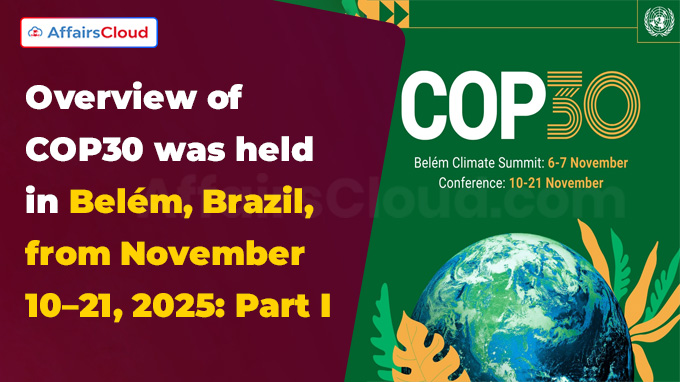The 30th session of the United Nations Climate Change Conference or 30th Conference of the Parties (COP30) to the United Nations (UN) Framework Convention on Climate Change (UNFCCC) took place from November 10 to 21, 2025, in Belem, Brazil.
- The COP30 summit was presided over by Brazilian diplomat André Aranha Corrêa do Lago, who served as the COP30 President.
- The 2025 summit marks the first time being hosted in the Amazon region, emphasizing the importance of forests, biodiversity, and indigenous people in climate action.
Exam Hints:
- What? 30th UN Climate Change Conference (COP30)
- When? November 10–21, 2025
- Where? Belem, Brazil (first time hosted in Amazon region)
- Chair/President: André Aranha Corrêa do Lago (Brazil)
- Indian Delegation Head: Union Minister Bhupender Yadav, MoEFCC
- USA Participation: Absent for first time in COP history
- Global Cooling Watch Report: Threefold increase (Cooling demand) by 2050, adoption of Sustainable Cooling Pathway
- GMSR 2025: China (1st), USA (2nd), India (3rd)
- CCPI 2026: Top 3 no countries, Denmark (4), UK (5), India (23rd)
- MHESW 2025: Utilized by 199 countries, increased by 113% in 10 years.
Highlights of COP30 Summit :
Participation: The summit witnessed participation from over 195 countries, world leaders, negotiators, scientists, civil society groups, indigenous communities, youths, and international organizations.
- COP30 was the second-largest COP ever, with 56,118 registered delegates, surpassed only by COP28 in Dubai, which saw over 80,000 attendees.
Indian Delegation : The Indian delegation at COP30 was led by Union Minister Bhupender Yadav, Minister of Environment, Forest, and Climate Change(MoEFCC).
USA Skips: For the first time in COP history, the United States of America(USA) was absent from the summit, after its Office of Climate Diplomacy was closed.
Reports Launched at COP30:
Global Cooling Watch Report 2025:
Overview: On November 11, 2025, During the summit, United Nations Environment Programme (UNEP) launched the 2nd edition of the Global Cooling Watch Report.
Cooling Demand: The report highlights that global cooling demand could increase more than threefold by 2050 under a business-as-usual scenario.
- The surge is driven by population growth, rising incomes, more extreme heat events, and a wider use of inefficient cooling technologies among low-income households.
Emissions Impact: As per the report, the cooling-related Greenhouse Gas (GHG) emissions could almost double compared to 2022, reaching 7.2 billion tons of Carbon Dioxide (CO2) by 2050, despite improvements in energy efficiency, refrigerant management, and grid planning.
Cooling Pathway: The report recommends adopting a Sustainable Cooling Pathway, which could cut expected 2050 emissions by 64%, reducing them to 2.6 billion tonnes of CO2.
Power Sector Decarbonization: The report highlights the decline in residual cooling emissions by up to 97% relative to the business-as-usual scenario, when the Sustainable Cooling Pathway is combined with rapid decarbonization of the global power sector.
UNEP Global Methane Status Report 2025:
Overview: On November 17, 2025, during the summit UNEP released a report titled “Global Methane Status Report (GMSR) 2025”, developed by UNEP and Climate and Clean Air Coalition (CCAC). According to the report, China tops the list, followed by the United States of America (USA).
- GMSR provides an updated assessment of global methane mitigation progress, identifies the gaps to achieve the Global Methane Pledge, and outlines opportunities for enhanced ambition.
India-Specific: As per the 2025 report, India has become the world’s third largest methane emitter by emitting 31 million tonnes (MT) of methane(CH4) in 2020, accounting for 9% of global emissions.
- India’s agricultural methane emissions contribute 12% of global agricultural methane, driven by sources such as livestock, the largest contributor, rice cultivation, which could increase by 8% by 2030, and stubble burning of crop residues.
Policy Gap: The report highlights that India has a policy gap to reduce methane from agriculture. It also emphasizes that India’s Nationally Determined Contributions (NDCs) under the Paris Agreement 2015 do not include specific agricultural methane targets.
Global Methane Pledge: It is an international initiative launched at the 26th Conference of the Parties (COP26) by the USA and the European Union in 2021, with an aim to reduce global methane emissions by at least 30% from 2020 levels by 2030.
Climate Change Performance Index (CCPI) 2026:
Overview: On the sidelines of the COP30 summit, Germanwatch, an environmental think tank, in collaboration with New Climate Institute, and Climate Action Network (CAN), released the Climate Change Performance Index (CCPI) 2026. As per the index, India ranks 23rd with a score of 61.31, dropping 13 positions compared to last year.
- The report evaluates 67 countries based on 14 indicators across categories such as GHG emissions, Renewable Energy (RE), Energy use, and Climate policy.
Global-Specific: No country has achieved a “very high” rating to be ranked in the top three spots. Countries such as the USA ranked 65th with a score of 27.63, Islamic Republic of Iran (66) (14.33), and Saudi Arabia (67) (11.90) were ranked in the “Very Low” category.
India-Specific: India scored “medium” rating in emissions, policy and energy use, and “low” in RE. The decline is driven by the continued coal dependence, rising emissions, auctions of new coal blocks, and social or environmental issues in RE projects.
Top 5 countries in CCPI 2026:
| Rank | Country | Score |
|---|---|---|
| 1-3 | – | – |
| 4 | Denmark | 80.52 |
| 5 | United Kingdom (UK) | 70.80 |
| 6 | Morocco | 70.75 |
| 7 | Chile | 70.63 |
| 8 | Luxembourg | 70.45 |
| 23 | India | 61.31 |
Global Status of Multi-Hazard Early Warning Systems 2025 Report:
Overview: During the summit, the United Nations Office for Disaster Risk Reduction (UNDRR) and World Meteorological Organization (WMO) launched the “Global Status of Multi-Hazard Early Warning Systems (MHEWS) 2025” report.
- The report reviews global progress under the UN’s Early Warnings for All (EW4All) initiative, which aims to provide every person on the planet with an early warning system by 2047.
Systems Utilization: The report highlights the increase in utilization with 199 countries, accounting for 60%, having Multi-Hazard Early Warning Systems by 113% in 10 years. However, major gaps remain, particularly in Small Island Developing States (SIDS), where only 43% have basic systems.
Pillars: The functions of four pillars such as Risk Knowledge, Monitoring, Observing & Forecasting Hazards, Warning Dissemination & Communication, and Preparedness & Early Action, have increased by 45% globally since 2015.
Toolkit Launch: Alongside, a new Extreme Heat Risk Governance Framework and Toolkit was launched to help authorities better address the growing threat of extreme heat. It provides practical guidance for decision makers.
Climate Risk Index(CRI) 2026:
Overview: Germanwatch released the Climate Risk Index (CRI) 2026, an annual climate impact-related indices, which analyses the degree of effect of climate-related extreme weather events in countries.
India-Specific: As per the report, India ranks 9th globally, with nearly 430 extreme weather events killing more than 80,000 people.
Global-specific: Between 1995 and 2024, countries such as Dominica, Myanmar, and Honduras were affected by extreme weather events. In 2024, Saint (St).Vincent and the Grenadines, Grenada, and Chad suffered the most.
- Between 1995 and 2025, over 832,000 people died, and direct economic losses exceeded USD 4.5 trillion from over 9,700 events.
State of the Global Climate Update:
Overview: WMO released the Global Climate Update, which indicates that 2025 is projected to be the second or third warmest year on record.
Global Temperature: The report emphasizes the period between 2015 and 2025 is set to become the warmest decade, with global temperatures from January to August 2025 registering 1.42 degree (°) Celsius (C) above pre industrial levels.
About United Nations Framework Convention on Climate Change (UNFCCC):
Executive Secretary – Simon Stiell
Headquarters – Bonn, Germany
Established – 1994





